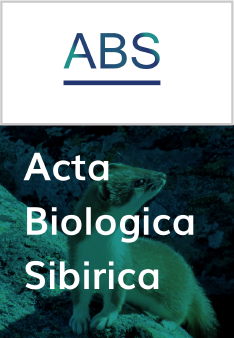Abstract
Extreme waterfall conditions cause partition of aquatic ecosystems of waterfall streams into discrete zones. To assess the features of aquatic ecosystems that function in waterfall streams, macroinvertebrate communities of the Tevenek River (Lake Teletskoye basin, Northeastern Altai) were examined above and below the waterfall. The diversity, abundance, and biomass of macroinvertebrates were higher above than below the barriers. Gammarus korbuensis showed the most significant decrease in number (from 3.1 to 2.3 thousand ind./m2) probably due to the intensive use of amphipods as food for fish living in Lake Teletskoye. An additional factor in favor of the high species richness of macroinvertebrates in the upper reaches is the geomorphology of the waterfall river valley that contributes to the formation of more diverse conditions above the waterfalls. Hydrobiological studies of waterfall streams can help to understand the restructuring of benthic communities divided as a result of the human impact.
References
Bailey RC, Linke S, Yates AG (2014) Bioassessment of freshwater ecosystems using the Reference Condition Approach: comparing established and new methods with common data sets. Freshwater Science 33 (4): 1204–1211. https://doi.org/10.1086/678771
Bakanov AI (1987) Quantitative assessment of dominance in ecological communities. Borok, 64 pp. [In Russian]
Baker K, Chadwick MA, Wahab RA, Kahar R (2017) Benthic community structure and ecosystem functions in aboveand below-waterfall pools in Borneo. Hydrobiologia 787 (1): 307–322. https://doi.org/10.1007/s10750-016-2975-4
Blaber SJM, Whitfield AK (1977) The feeding ecology of juvenile mullet (Mugilidae) in south-east African estuaries. Biological Journal of the Linnean Society 9: 277–284. https://doi.org/10.1111/j.1095-8312.1977.tb00270.x
Bowman MF, Somers KM (2005) Considerations when using the reference condition approach for bioassessment of freshwater ecosystems. Water Quality Research Journal 40 (3): 347–360. https://doi.org/10.2166/wqrj.2005.039
Clayton PD, Pearson RG (2016) Harsh habitats? Waterfalls and their faunal dynamics in tropical Australia. Hydrobiologia 775: 123–137. https://doi.org/10.1007/s10750-016-2719-5
Covich AP, Crowl TA, Hein CL, Townsend MJ, McDowell WH (2009) Predator-prey interactions in river networks: comparing shrimp spatial refugia in two drainage basins. Freshwater Biology 54: 450–465. https://doi.org/10.1111/j.1365-2427.2008.02121.x
Fitzsimons JM, McRae MG (2007) Behavioral ecology of indigenous stream fishes in Hawai'i. Environmental Studies 3: 11–21.
Fontana V, Guariento E, Hilpold A, Niedrist G, Steinwandter M, Spitale D, Nascimbene J, Tappeiner U, Seeber Ju (2020) Species richness and beta diversity patterns of multiple taxa along an elevational gradient in pastured grasslands in the European Alps. Scientific Reports 10: 12516. https://doi.org/10.1038/s41598-020-69569-9
Holomuzki JR, Hoyle JD (1990) Effect of predatory fish presence on habitat use and diel movement of the stream amphipod, Gammarus minus. Freshwater Biology 24: 509–517. https://doi.org/10.1111/j.1365-2427.1990.tb00728.x
Jonck C, Aranha JMR (2010) Influence of a waterfall over richness and similarity in adjoining pools of an Atlantic Rainforest stream. Acta Limnologica Brasiliensia 4: 378–383. https://doi.org/10.4322/actalb.2011.003
Koleff, P, Gaston KJ, Lennon JJ (2003) Measuring betadiversity for presence-absence data. Journal of Animal Ecology 72: 367–382. https://doi.org/10.1046/j.1365-2656.2003.00710.x
Li Z, Wang J, Liu Z, Meng X, Heino J, Jiang X, Xie Z (2018) Different responses of taxonomic and functional structure of stream macroinvertebrate communities to local stressors and regional factors in a subtropical biodiversity hotspot. Science of The Total Environment 655: 1288–1300. https://doi.org/10.1016/j.scitotenv.2018.11.222
March JG, Pringle CM, Townsend MJ, Wilson AI (2002) Effects of freshwater shrimp assemblages on benthic communities along an altitudinal gradient of a tropical island stream. Freshwater Biology 47: 377–390. https://doi.org/10.1046/j.1365-2427.2002.00808.x
Pechlaner R (1984) Historical evidence for the introduction of Arctic charr into high-mountainlakes of the Alps by man. In: Johnson L, Burns BL (Eds) Biology of the Arctic Charr. Johnson J. University of Manitoba Press, Winnipeg, Manitoba, 449–557.
Rackemann, SL, Robson, BJ, Matthews TG (2012) Conservation value of waterfalls as habitat for lotic insects of western Victoria, Australia. Aquatic Conservation: Marine and Freshwater Ecosystems 23 (1): 171–178. https://doi.org/10.1002/aqc.2304
Roswell M, Dushoff J, Winfree R (2021) A conceptual guide to measuring species diversity. Oikos 130 (3): 321–338. https://doi.org/10.1111/oik.07202
Rudneva LV (1995) Taxonomic composition of drifting benthic invertebrates in a small river of Lake Teletskoye basin. Topical issues of biology: Heads of report. Barnaul, 163-165. [In Russian]
Stoddard JL, Larsen DP, Hawkins CP, Johnson, RK, Norris RH (2006) Setting expectations for the ecological condition of streams. The concept of reference condition. Ecological Applications 16 (4): 1267–1276. https://doi.org/10.1890/1051-0761(2006)016[1267:SEFTEC]2.0.CO;2
Tuomisto H (2010) A diversity of beta diversities: straightening up a concept gone awry. Part 1. Defining beta diversity as afunction of alpha and gamma diversity. Ecography 33: 2–22. https://doi.org/10.1111/j.1600-0587.2009.05880.x

This work is licensed under a Creative Commons Attribution 4.0 International License.

